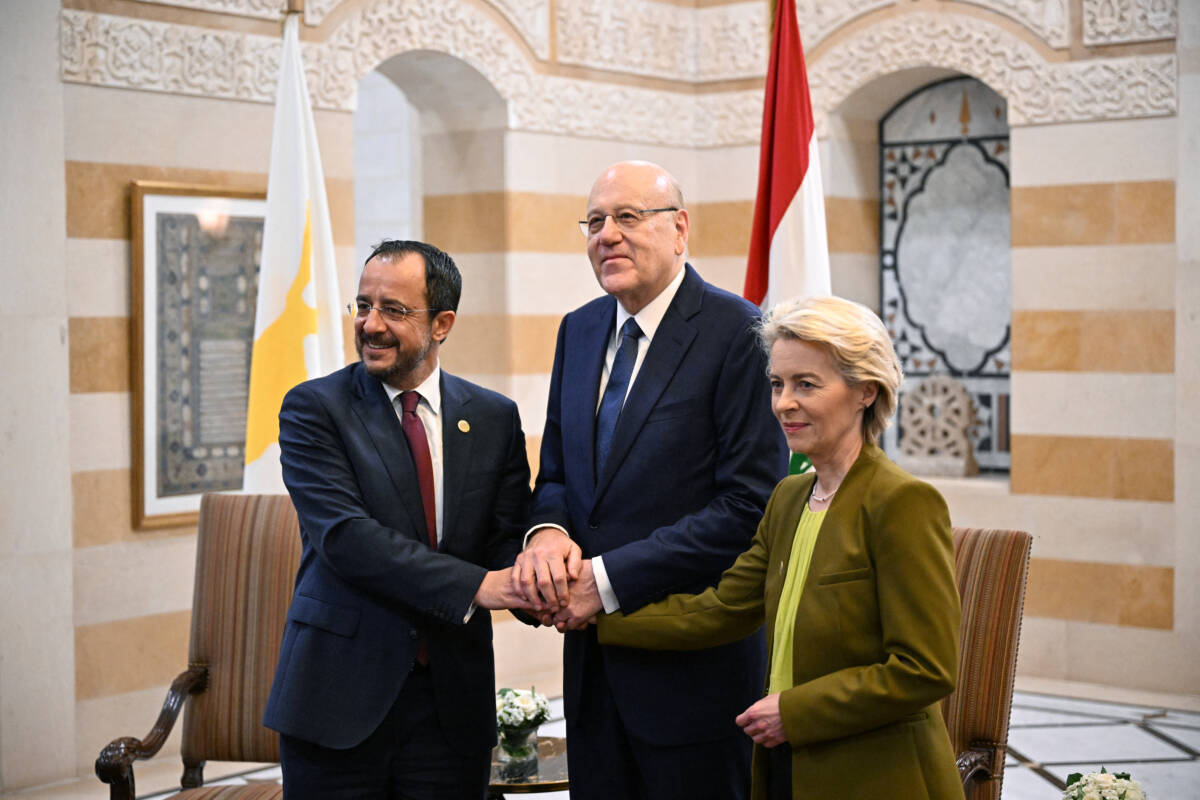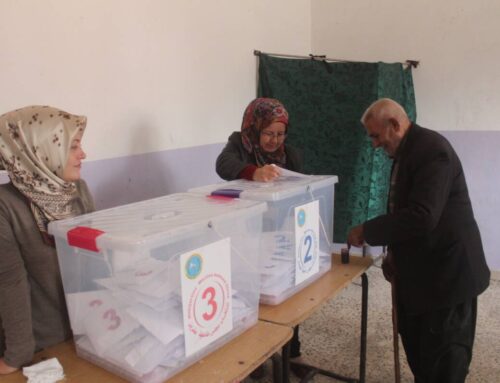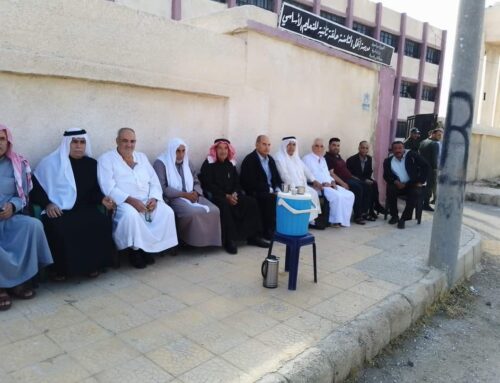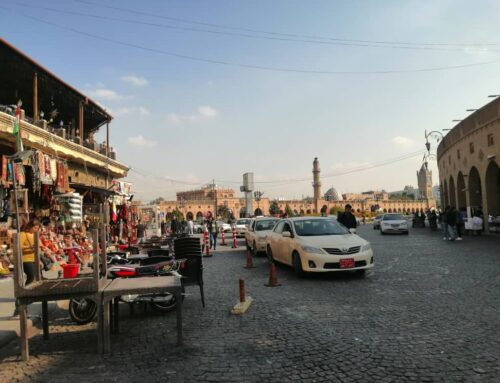EU-Lebanon aid deal blows back on Syrian refugees
A billion-euro EU aid package to Lebanon, in part to stem migration, caused an uproar in the country and triggered a crackdown on Syrian refugees that advocates warn will only push more to flee abroad
22 May 2024
BEIRUT — A billion-euro European Union (EU) aid package to Lebanon, in part aimed at stemming irregular migration, gave a green light for an “unprecedented” crackdown on Syrian refugees in the Mediterranean country, human rights advocates say. They warn increased pressure and deportations of refugees will drive more to risk their lives to reach Europe.
On May 2, European Commission President Ursula von der Leyen announced the EU would provide Lebanon with 1 billion euros until 2027, with 736 million euros going to support Syrian refugees and other “vulnerable groups” in Lebanon and 200 million euros to bolster Lebanese security agencies in enforcing border and migration controls.
On May 8, less than a week after von der Leyen’s aid announcement, Lebanon’s General Security—the agency in charge of enforcing immigration laws—announced a country-wide crackdown on Syrians “illegally” residing in the country without residency papers. Most Syrians in Lebanon do not have legal residency, largely due to stringent renewal procedures.
General Security mandated the closure of “illegal” Syrian-run businesses and ordered Lebanese citizens not to “employ, shelter or provide housing” to Syrians without residency, among other directives. It also resumed Lebanon’s “voluntary return” campaign. Human rights groups have condemned the measures.
“Von der Leyen’s visit triggered an unprecedented hate campaign against Syrians, unseen in the last 12 years,” Wadih al-Asmar, head of the EuroMed Rights human rights network and the Lebanese Center for Human Rights (CLDH) in Lebanon, told Syria Direct.
Lebanon hosts the largest number of refugees per capita and per square kilometer in the world. The government estimates that around 1.5 million Syrian refugees reside in the country, which has a population of about 5.2 million.
Hostilities towards Syrian refugees were already high in Lebanon following the killing of Pascal Sleiman, a member of a right-wing Christian political party, in April. The inclusion of EU aid for Syrians in the announced aid package also ignited an uproar among multiple Lebanese political parties, who said the EU was “bribing” Lebanon to keep unwanted Syrians.
Read more: Fear grips Syrian communities as violence surges in Lebanon
‘Electoral fears’
Despite von der Leyen’s high-profile visit and press announcement of the latest aid package, it is not dramatically different from what the EU has offered Lebanon in previous years, al-Asmar, who is in touch with European policymakers and officials, told Syria Direct.
Since 2011, the EU has channeled more than 3 billion euros to Lebanon, largely directed towards the response to the Syrian crisis. The only notable difference in the May 2 EU aid announcement was a more vocal commitment to bolster Lebanon’s security apparatus to stem migration, al-Asmar added.
For the European Commission president, focusing on migration in the announcement spoke to political concerns back home. Migration is a central issue in the upcoming European elections set to begin on June 6, in which von der Leyen is in the running for reelection.
“Migration is regularly cited [as] one of voters’ priorities when it comes to elections, so of course there is an incentive for von der Leyen to deliver on the EU’s agenda,” Lucas Rasche, a policy officer with Misereor, a German NGO working in development cooperation, told Syria Direct. “These deals, regardless of how useful they are, are a way of signaling that ‘we are taking care of these issues’,” Rasche, who has studied migration trends to Europe, added.
Also ahead of the elections, on May 14 the European Council adopted a landmark overhaul of its migration and asylum policies that will see tightened border control measures and ensure burden sharing among member states. Critics say the pact aims at keeping people out of Europe and infringes on refugees’ rights to claim asylum.
“The EU-Lebanon deal is a policy driven by electoral fears in the run-up to the elections. It’s completely detached from the harsh reality on the ground [in Lebanon],” Willem Staes, the Middle East policy officer with the Belgium-based civil society organization 11.11.11, told Syria Direct.
Von der Leyen’s visit “greenlighted a massive and absolutely unprecedented escalation [against Syrians], and was almost immediately followed by an announcement from the General Security that puts hundreds of thousands of people at imminent risk of deportation,” Staes said.
Driving migration
Staes also criticized the EU for channeling resources to one of the key drivers of Syrians’ irregular migration to Europe: Lebanon’s security forces.
The Lebanese Armed Forces (LAF) deported thousands of Syrians back to Syria in 2023, in violation of both Lebanese law and the country’s international rights obligations. So far in 2024, more than 1,000 Syrians may have been deported, according to the Access Center for Human Rights (ACHR), a human rights organization based in Beirut and Paris.
Far from curbing departures, the threat of deportation and worsening conditions in Lebanon pushes thousands more Syrians to risk their lives to escape and reach Europe.
“Providing financial support to Lebanese security agencies under the guise of ‘migration management’ and the stated aim to curb migration movements to Europe could actually result in an increased number of Syrians who try to reach Europe’s shores, more refugees drowning in the Mediterranean Sea and an intensification of the activities of smuggling networks,” five international rights groups, including ACHR, warned in a joint policy brief provided to Syria Direct.
Read more: Syrians sail for Cyprus in the thousands as island seeks to stem the tide
Of 331 Syrian refugees in Lebanon who the five rights groups interviewed between April 26 and May 3, 88 percent indicated that the deteriorating security situation for Syrian refugees and increasing deportations influenced their decision to leave Lebanon for Europe.
“At the end of the day, any policy or deal that doesn’t manage to reach some kind of quid pro quo with the Lebanese government to stop the forced deportations is going to fail,” Staes said.
‘I can’t live in Lebanon or Syria’
The fear of deportation to Syria and Lebanese authorities’ tightening chokehold on refugees in recent months has left 41-year-old Abdulrahman Muhammad Ali with no other option but to attempt to leave Lebanon by boat with his wife and five young children, he said.
“I can’t live in Lebanon or Syria. In Lebanon, the future of my children is unfortunately lost, and Syria is not safe,” Ali, who fled Syria’s Aleppo countryside for Lebanon in 2014, told Syria Direct.

Abdulrahman Muhammad Ali, 41, shows a WhatsApp conversation with a smuggler advertising trips to Europe, 3/5/2024 (Hanna Davis/Syria Direct)
On November 21, 2023, General Security officers arrived at Ali’s home in the early morning, arrested him and dropped him at Lebanon’s border with Syria. He stayed in Aleppo for just over a month before finding a smuggler who he paid around $300 to bring him back to Lebanon illegally, he recounted.
Of 299 Syrians deported last year who ACHR was able to interview, the majority were later smuggled back into Lebanon, the organization’s director, Mohammad Hassan, told Syria Direct. Other deportees became unreachable as soon as they entered Syria. “ACHR is concerned that they might be arrested or even worse,” Hassan said.
“In 2024, ACHR is observing the same pattern, which shows how ineffective and unsustainable the forced deportation policy is,” he added.
Since returning to Lebanon on January 2, Ali has attempted to escape the country four times by boat to Cyprus, costing him around $5,200 in total. Due to rough seas, mechanical failures and a return by the Lebanese army, all his attempts failed. Still, he is not deterred.
Last week, municipal police notified Syrians in the village of Kouba, where Ali lives, that they had 15 days to leave their homes. In fear of being deported to Syria again, Ali said he will attempt a fifth boat crossing—this time to Italy—in a few days.
Read more: Thousands of Syrians facing eviction as Lebanon cracks down
“These deals don’t change anything regarding people’s intention to leave miserable situations,” Rasche of Misereor said. “If you close one border, or make it more difficult to cross, migration doesn’t stop. People find other ways, and these ways are often more difficult, more dangerous and more costly.”
‘Dangerous deals’
The EU-Lebanon deal is a near carbon copy of other recent migration agreements to bolster countries’ security forces to stem migration—including recently with Egypt, Tunisia and Mauritania—that have been criticized for glossing over the root causes of migration and the protection of human rights.
“They are all dangerous deals that will lead to more violence against refugees and also more irregular migration towards Europe,” Staes said.
In 2016, as increasing numbers of Syrians arrived in Europe, the EU entered a landmark agreement with Turkey to limit the number of asylum-seeker arrivals. The deal set a blueprint for future EU deals to shift responsibility for European migration management to neighboring countries.
Staes noted that while the EU-Turkey deal “at best” led to a short-term decrease in the number of irregular crossings to Europe, it did not manage to provide any sort of long-term solution for Syrian refugees in Turkey.
He also noted that the numbers of Syrians trying to reach Europe through the Eastern Mediterranean Route via Turkey picked up in 2023, with an “enormous number” of Syrians attempting the route.
“It’s almost an empirical fact that as soon as you don’t tackle these root causes—like insecurity in host countries, forced deportations—sooner or later people will try again because you give them no other option,” Staes said.
‘Durable solutions’
A more sustainable deal between the EU and Lebanon could involve an agreement by Lebanon to stop forced deportations and provide more legal residency and work permits to Syrians, Staes suggested. In return, the EU could step up its financial support and “significantly increase” resettlement efforts and economic cooperation initiatives, he added.
More resettlement opportunities, greater protection and more avenues to obtain legal residency and work permits in Lebanon were all listed as priorities for an EU deal by Syrians interviewed for the joint policy brief sent to Syria Direct.
Over the past 12 years, only about 100,984 refugees have been resettled from Lebanon to third countries, according to UNHCR figures. In 2023, only 2,800 Syrians were resettled in the EU from Lebanon, according to Refugees International.
Meanwhile, funding to the UN Refugee Agency (UNHCR) in Lebanon has steadily declined: from 68 percent of needs funded in 2018 to only 39 percent of needs funded at the end of 2023.
ACHR’s Hassan called on the EU to refocus attention towards addressing the root causes of insecurity and danger in Syria. “The main barrier behind Syrians’ inability to repatriate is the existing political and security regime and other armed groups,” he said. “Europe seems to have given up on Syrians’ aspirations for a democratic country.”
“Humanitarian assistance is highly needed, but without mitigating the reasons behind displacement, financial aid and deals with regional countries to control their borders won’t be durable solutions,” Hassan concluded.
*Correction 23/5/2024: The original version of this report incorrectly attributed the quote beginning with “These deals don’t change anything regarding people’s intention to leave miserable situations” to Willem Staes. This statement was made by Lucas Rasche. Syria Direct regrets the error.







